
The Free Press

“New Hampshire is first in the nation. It is not the last in the nation,” said Nikki Haley in her concession speech last night, after losing to Donald Trump. “This race is far from over,” she added.
The polls suggest otherwise. New Hampshire, with its open primary and independent streak, was Haley’s best shot at beating Donald Trump, and she fell short. Everywhere else, she is miles behind the former president.
In other words, it’s over.
It wasn’t supposed to be this way. Trump’s political obituary was written on January 6, 2021. Now, three years later, his future as a candidate isn’t just alive—he’s polling ahead of President Joe Biden in head-to-head matchups, and has shrugged off his Republican rivals in Iowa, and now New Hampshire, without breaking a sweat.
In the press, his glide path toward the GOP’s third presidential nomination has been met with fulminating and increasingly naked bias. Witness, for example, the decision by CNN and MSNBC not to air his victory speeches in Iowa. And rather than trying to understand Trump’s voting base, many in the media have villainized them as fascists. If you think I’m exaggerating, just look at Rachel Maddow’s comments after Trump’s win in Iowa. The greatest threat of “our democracy falling to an authoritarian and potentially fascist form of government,” Maddow concluded, is “. . . people wanting that.”
Yet again, the coverage of Trump is missing a serious effort to understand why a man impeached, indicted, and so reviled is the favorite candidate of the GOP base. In his essay today for The Free Press, Martin Gurri writes that the media’s lack of curiosity about Trump’s appeal reflects a larger problem in America.
“Trump appears to act as a sort of funhouse mirror on which the progressive elites who run most institutions, including the federal government, see themselves reflected in the most monstrous and frightening light,” Gurri writes. “The malady now exposed is this: the elites have lost faith in representative democracy. To smash the nightmare image of themselves that Trump evokes, they are willing to twist and force our system until it breaks.”
Read Martin’s essay to understand how America’s elite gave up on the masses, and what it means for 2024 and beyond:
Stumbling toward the White House
The Republican primary is a done deal. Say what you want about the Republicans’ showing—the hot mics, the catfights, the gaffes—at least they gave it the old college try.
Though it feels like we’ve been talking about this election for years, a long and winding road still lies between us and November 7. Here’s what’s on our 2024 radar, post-New Hampshire.
→ Is Haley really hanging about? The biggest question facing Nikki Haley after last night’s result was whether she would drop out before South Carolina’s primary on February 24. Yes, she said she wasn’t going anywhere last night. But she has a full month until South Carolina. A month in which donors will wonder whether their money is being well spent—and in which Haley must stew over the choice between the humiliation of exiting the race before primaries in her home state, or the humiliation of fighting on and being beaten in her home state. (No one promised this would be fun, Madam Ambassador.) On primary day in New Hampshire, Haley’s message to donors was this: “We aren’t going anywhere.” But her second-place finish in New Hampshire offers next to nothing in the way of a path to victory.
→ As for the Democrats: Joe Biden won as a write-in candidate in New Hampshire’s renegade Democratic primary, with his main challenger Dean Phillips winning around 20 percent of the vote. Phillips was hoping a strong second, if not a surprise win, could deliver a shock to his own side and raise the alarm about an incumbent he thinks is set for defeat come November.
Phillips was aiming for a repeat of what happened in 1968, when LBJ’s surprisingly weak first-place finish in New Hampshire—he won only by single digits against Eugene McCarthy—contributed to his decision not to seek reelection. Yesterday, Phillips (like McCarthy, a Minnesotan) came a much more distant second behind Biden, who was a write-in candidate, not even on the ballot.
Phillips’s quixotic presidential bid, which is all but over, has been met with derision by his party’s establishment. But they have plenty to learn from the little-known lawmaker, and they can start by listening to his interview with CNN yesterday about attending a Trump rally. It was almost jarring to hear a politician talk about the other side’s supporters with that much empathy. “Basket of deplorables” it ain’t.
ICYMI: Here’s Dean Phillips on Honestly.
→ It’s the border, stupid: Inflation is no longer voters’ top concern, according to a new Harvard CAPS–Harris poll this week. The new major issue, it turns out, is whether Claudine Gay deserves a tenured and highly paid position at Harvard.
Just kidding. It’s the border.
The percentage of voters who see immigration as the biggest issue facing the nation has jumped seven points in one month to 35 percent. Bad news for the president, and arguably a bigger electoral liability than inflation.
Voters give Biden a 32 percent favorability rating on immigration—an all-time low. Since the start of the Biden administration, the U.S. has released more than 2.3 million migrants at the border, while 6 million migrants have been taken into Customs and Border Protection custody since the start of 2021.
Amid all the theorizing about Trump’s enduring appeal, perhaps the simplest explanation is the border: the issue that animated Trump’s rise nearly a decade ago is becoming an ever-bigger crisis—and, as Olivia Reingold reported for The Free Press yesterday, it continues to scramble our politics in all sorts of surprising ways.
→ Elise Stefanik’s audience of one: Say what you will about Elise Stefanik, but the New York congresswoman knows her customers. And when it comes to campaigning hard for Donald Trump, perhaps in the hope that he picks her as his running mate, unflinching loyalty is the name of the game.
Witness, for example, her impressive spin after Donald Trump appeared to mix up Nikki Haley and Nancy Pelosi in a recent speech by repeatedly blaming Haley, not then–Speaker Pelosi, for the lack of security in Congress on January 6. Asked about the confusion, Stefanik said, “That isn’t a mix-up. . . Nikki Haley is relying on Democrats, just like Nancy Pelosi, to try to have a desperate showing in New Hampshire.” When the reporter pointed out that Trump was talking about January 6, Stefanik said: “President Trump has not lost his step. He is a stronger candidate, stronger. . . than he was in 2016 and he was in 2020. Compare that to Joe Biden’s weakness.”
Never apologize, never explain.
We get the elections we deserve. Apparently, in 2024, we deserve nothing better than “My candidate is less mentally impaired than the other candidate.”
→ The Mindy project: Speaking of vice-presidential hopefuls, Tim Scott got engaged to his girlfriend Mindy Noce on Saturday night in Kiawah Island, South Carolina. Congratulations, Senator!
Noce, a Charleston-area interior designer and pickleball enthusiast, wore a sparkly white jacket for the beach walk when Scott popped the question. Perhaps she is politically astute enough to have seen a proposal coming after Scott endorsed Trump a day earlier. “[Tim Scott] is engaged to be married,” Trump said at a rally in New Hampshire Monday. “We never thought this was going to happen. What’s going on?”
In Trump-speak, that’s the equivalent of a massive congratulations. I think.
The Canadian truckers’ day in court
Back in 2022, the battle between Justin Trudeau and Canada’s truckers over vaccine mandates came to symbolize a lot more: a clash over power and freedom in the pandemic era. It’s a fascinating story that Free Press reporter Rupa Subramanya has been following from the start. Now, she brings us an update:
The Federal Court of Canada delivered a major blow to Prime Minister Justin Trudeau yesterday, ruling that his government exceeded its authority when it claimed special powers in response to the truckers’ protest in Ottawa in 2022.
The revolt over Covid rules did not pose a threat to national security as required by the Emergencies Act, the court decided, meaning Trudeau’s government violated the Charter of Rights and Freedoms—Canada’s equivalent to the Bill of Rights.
By invoking the Emergencies Act, Trudeau gave himself extraordinary powers, imposing draconian measures such as empowering the federal finance minister to freeze the personal bank accounts of protesters without requiring a court order. The RCMP, Canada’s equivalent of the FBI, ordered banks to freeze 257 individual accounts.
For the truckers on the receiving end of the government’s emergency powers, the decision is a long overdue win. Immediately after the court’s decision, I called Peter, a trucker I first spoke to while reporting on the protest for The Free Press in 2022. He was not comfortable sharing his full name.
Since we last spoke, he had lost his trucking business because of the harsh vaccine mandates and only recently feels he is getting back on his feet. His brother, also a trucker who had supported the protest, had his truck impounded by the feds under the emergency powers. (It was eventually returned to him.) Peter is heartened by the federal court’s decision. “We have a voice,” he told me. “It’s a good start toward accountability.”
Chris Clarke, another trucker I first met back in 2022, told me he welcomed the ruling but doubts that things are really going to change. He believes there need to be civil lawsuits following this decision to compensate the truckers, and some accountability for Trudeau himself.
“Going against a corrupt government is exhausting. They know they have the power and endurance to outlast their citizens and exhaust them while staying in power,” said Clarke.
Ed Cornell, a retired gunner from New Brunswick, was one of the protesters who had his account frozen in 2022.
When that happened, Cornell had no way to appeal the decision and was given no explanation by the authorities. “It was the biggest blow that you could imagine,” Cornell told The Free Press yesterday. “It made me look over my shoulder, a feeling that has never gone away. You stand up for your country for so long, and then your country betrays you.”
Bruce Pardy, a prominent Canadian constitutional scholar, told The Free Press: “The court correctly said that the government’s invocation of the Act relied on the statutory requirement for ‘threats or use of acts of serious violence.’ And there weren’t any.”
Pardy called the decision “well-reasoned,” adding: “We still have some kind of rule of law in this country.”
Trudeau’s deputy prime minister, Chrystia Freeland, has already indicated that the government will appeal the federal court’s decision. It will next go to the Federal Court of Appeal and will almost certainly wind up in the Supreme Court. Whatever that court’s ruling, yesterday’s defeat comes at a bad time for Trudeau’s government, which is being hammered in the polls and must face an election before October next year. The Conservative Party’s charismatic leader, Pierre Poilievre, is sure to make hay of the decision by reminding Canadians that his was the only major party that opposed invoking the Emergencies Act in Parliament.
No matter how things turn out in the end, it’s clear that a line has been drawn in the sand when it comes to federal government overreach into the lives of private citizens.
Meanwhile, Cornell says the court’s decision is a “poke in the face of our government. And it says to them that you’re not going to get away with this. The people know what you did.”
Justice for Barbie!
The Oscar nominations were announced yesterday, and Christopher Nolan’s Oppenheimer led the field with nods from Academy Awards voters in 13 categories. (Here’s the full list.) Barbie, last summer’s bubblegum yin to Oppenheimer’s Promethean yang, collected eight nominations. (Both films were nominated for Best Picture, setting up the ultimate Barbenheimer showdown.) But Greta Gerwig and Margot Robbie were notably absent from the list of nominees for the Best Director and Best Actress categories, much to the frustration of Suzy Weiss, who gave Barbie a glowing review in The Free Press.
Here’s Suzy, calling for justice for the women who painted the world pink last summer:
A little part of me is happy when my favorite movies or performances aren’t nominated for an Academy Award. Getting an Oscar whets the appetite for more Oscars. And too often, would-be artists become trophy chasers, jumping through the increasingly narrow and bizarre hoops set by the powers that be to produce a set of winners that comport with the identity-obsessed politics of the moment.
But Greta deserved a nomination.
So did Margot Robbie. The two women who helmed Barbie as its director and star gave cinema a much-needed dose of fun and pink joy this summer (not to mention banger box office numbers). It seems Hollywood can’t take a win even when it’s right under their perfectly enhanced noses.
And there’s no Oscar justice either for the superb cast of May December—none of whom got a single nod. Nor Emerald Fennell, who—despite writing one of the darkest, funniest, and most original screenplays in the history of film (Saltburn)—failed to get a nomination in any category.
As Barbie would say: “The real world is forever and irrevocably messed up.”
ICYMI: The Free Press goes to the movies.
Oliver Wiseman is a writer and editor at The Free Press. Follow him on X @ollywiseman.
Become a Free Press subscriber today:



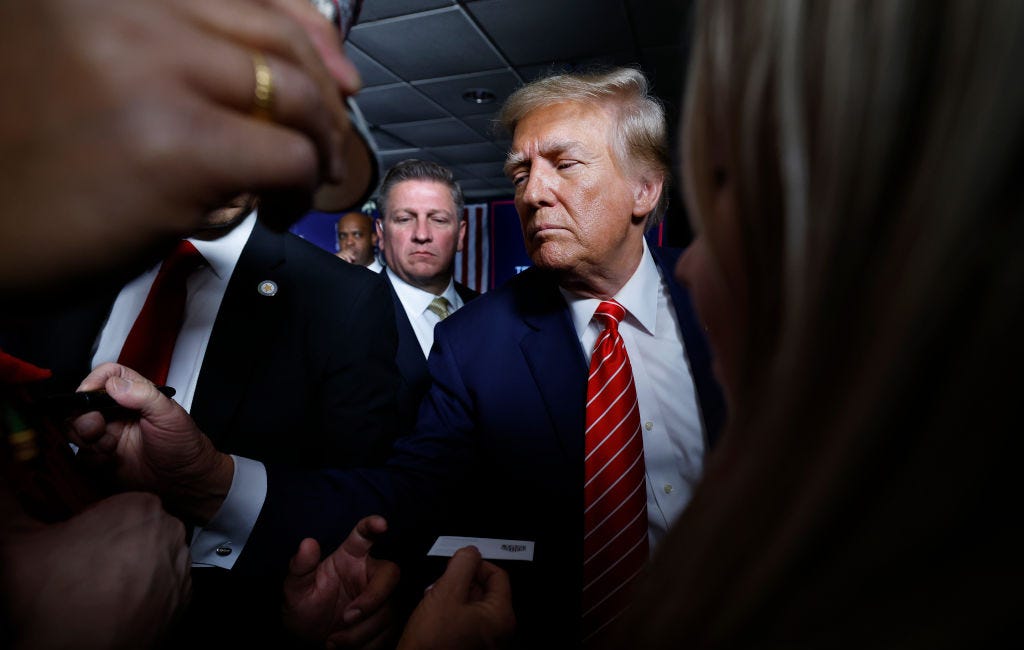




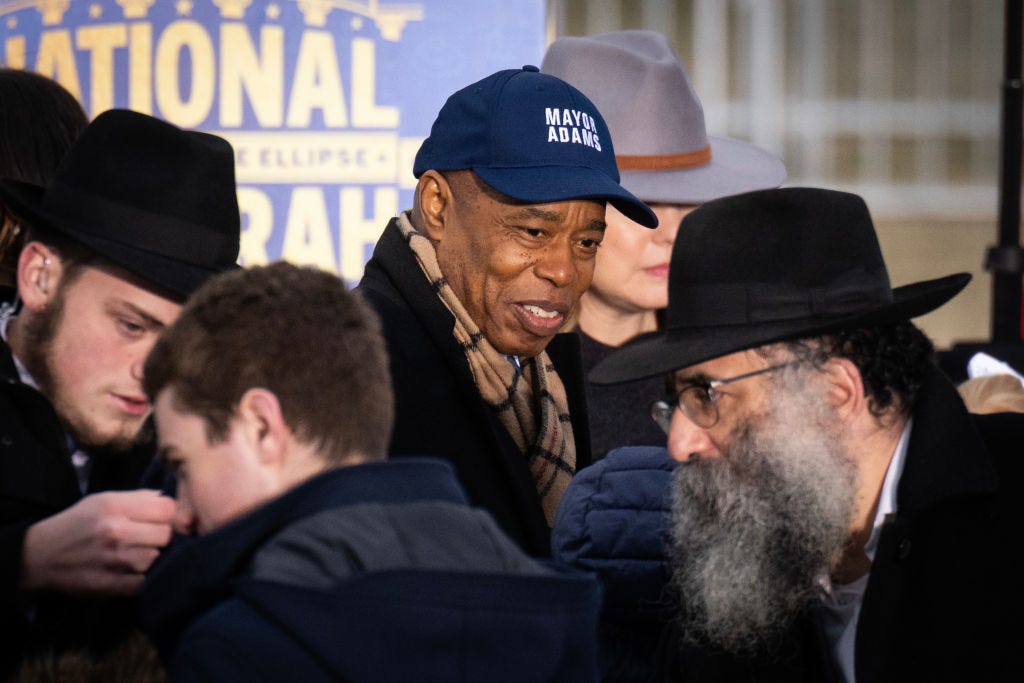

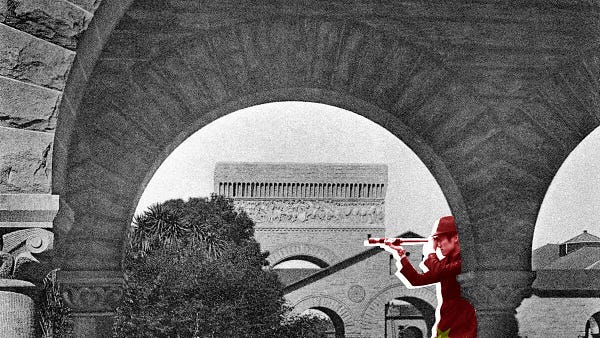

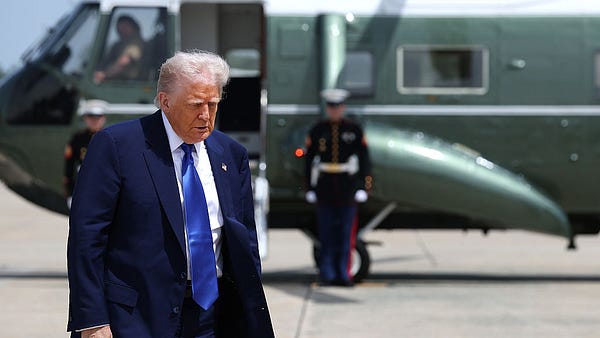

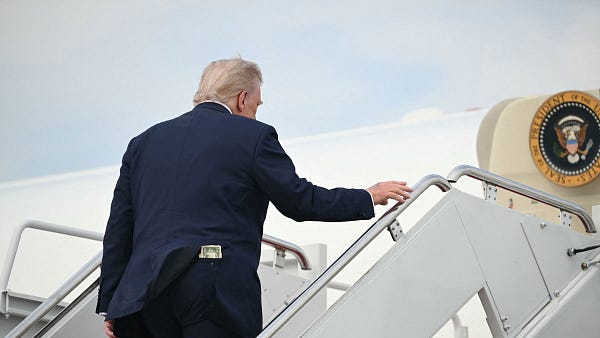

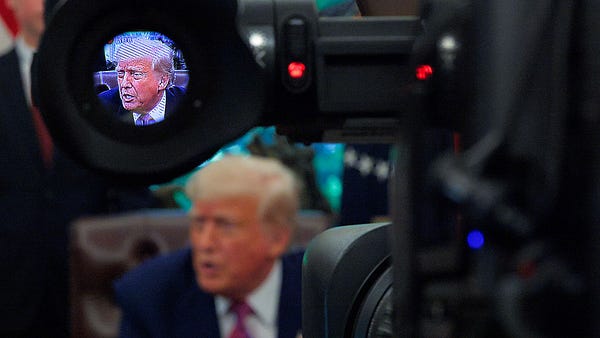


Why Trump? He's arrogant, sometimes childish, obsessed with his loss in 2020. Trump is all of those things. Why does he refuse to give up his fight for his second term as President? He's running because his entire first term was subject to the most vile lies and accusations ever leveled at an American politician. He has actually been compared to Adolf Hitler. Adolf Hitler. Really! Despite this, he managed to open a dialogue with business leaders to bring jobs back to America, primarily from China. Notice that this initiative came to a screeching halt when Joe "Mr. Middle Class" Biden took the presidency. Trump had virtually zero inflation, he lowered taxes for everyone -- yes, even for billionaires (horrors), the people who actually pay the majority of taxes. The southern border was locked up with only a trickle of illegal aliens slipping through. The stock market was in great shape as well. Why on earth is he fighting so hard for the Presidency. And why on earth does anyone support him?
Well, the Steele Dossier for one thing, which turned out to be Democrat opposition baloney; the infamous conversation with the Ukrainian official, which turned out to be more baloney; various and sundry untrue stories about the Trump children profiting from their father's position -- (compare that with Hunter Biden taking millions from Burisma after getting the prosecutor who was investigating that same company.) It seems to be true that they have accused Trump of the very things of which they themselves are guilty. Finally, in the maelstrom that was the Covid crisis, Trump did everything humanly possible to blunt the effects of the pandemic, including creating hundreds of hospital beds and getting car companies to retool to manufacture ventilators instead of cars. For this Gov. Andrew Cuomo called him every name in the book and then some. No good deed goes unpunished if you are Donald Trump.
And now, he's spending millions defending against a fraud lawsuit, claiming that he over-valued properties like Mar-a-Lago which the brilliant US attorney for the southern district of New York proposes is actually worth a paltry $18 million. Seriously.
He's also been slapped with a civil judgement of $81 million by "author," E. Jean Carroll who claims she somehow "found herself" in a Bergdorf dressing room with a man she hardly knew who "sexually abused" her. She can't recall when, not even the year let alone the month and day. Oh and she presents no witnesses and a NY jury awards her millions despite these circumstances. If anything actually transpired between the two, I'd venture to say it was consensual -- you know, kinda like the Bill Clinton/Monica Lewinsky affair. Isn't that how Democrats characterized the relationship? I would suggest that Ms. Carroll can't recall the date of the assault because Mr. Trump just might be able to prove he wasn't in New York at the time she cites. She's clever if nothing else. In any event, the "justice" system has been completely weaponized against him and, apparently, he is not permitted to defend himself. Democrats should realize, though, that the very system they own today can be turned against them in the future.
Yes, millions will support Donald Trump because he has been wronged, grievously wronged by un-elected, unaccountable bureaucrats who has seized the apparatus of the justice system and turned it against an individual citizen. And, in America, the Constitution is supposed to protect the individual against the tyranny of the government.
Some people sure have short memories. In the 2020 democratic primary Bernie Sanders won the IA caucuses (26%) nosing out mayor Pete (25%). Ditto NH: Sanders (26%) Buttigieg (24%). Next was the NV caucuses where Sanders earned a decisive 40% of the vote. Did either of these guys end up the nominee? No. It wasn’t til then 4th primary (SC) that Biden had a W (49%). His showing in the first three races was abysmal (14%,8%,19%). Who says IA and NH decide the nominee?
Polls don’t always predict what the voters will do. Ask Hillary. Stop being brainwashed by pollsters and journalists telling you your candidate can’t win. American Republicans and Independents (where legal) need to stop whining about a Trump-Biden rematch and vote in their states primaries/ caucuses. It ain’t over til it’s over.